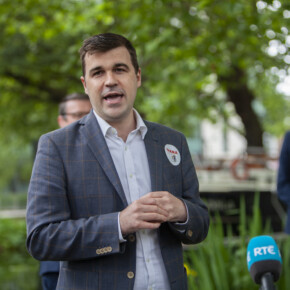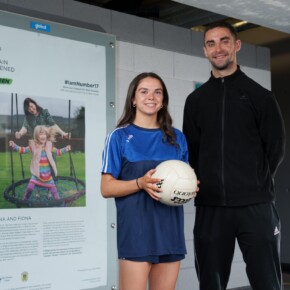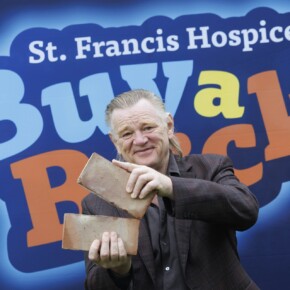Castleknock has plenty of bang for electoral buck
Mike Finnerty 01 Feb 2024
The big story of Castleknock at the 2019 locals was future Green Party Minister Roderic O’Gorman roaring home with 27% of first preferences, and Fine Gael Senator Emer Currie elected alongside him on the first count with just shy of 16% of first preferences.
Between them, O’Gorman and Currie took home around 43% of first preferences.
In the context of the 2024 race, it is not immediately apparent who may benefit from the massive surplus of votes considering both councillors have gone onto higher office.
Both O’Gorman and Currie were elected as a TD and Senator respectively following the 2020 general election, with Pamela Conroy and Siobhan Shovlin co-opted onto Fingal County Council.
O’Gorman’s personal vote share went from just shy of 10% in 2014 to 27.2% in 2019.
The air being let out of the Green balloon will have the most impact on the election race in Castleknock.
It is entirely possible for the Greens to lose more than half of their 2019 vote share and still get their candidate elected, but if 10-15% of first preferences come into play that majorly shakes up the race (which we will discuss later on in the piece).
Being an incumbent is always an advantage for a candidate to have heading into re-election, and Conroy and Shovlin appear to be well set for re-election.
Ted Leddy will also be running for Fine Gael, with Fine Gael looking to return two candidates once again in Castleknock.
Leddy will be looking to secure a 3rd consecutive term on Fingal County Council.
Castleknock is a 6-seater which means that parties both big and small will target it.
Fianna Fáil has selected the incumbent Howard Mahony to run again, and it is worth noting that Castleknock is something of a stronghold for Fianna Fáil.
The party has gotten their candidate elected without fail since 1985, so it would be a major upset if the party didn’t get their man elected again this June.
In recent weeks the party has selected Eimear Carbone-Mangan as a 2nd candidate.
Fianna Fáil’s candidates secured just over 15% of first preferences in 2019 compared to Fine Gael’s 27.8%.
It would be unlikely for both parties to get both of their candidates elected; one of them will have to blink.
Sinn Féin’s Natalie Treacy will now look to secure a term on Dublin City Council in Cabra-Glasnevin, with former Swords Councillor Phillip Lynam stepping in to run in her seat.
The party attempted to run two candidates last time with Tracey seeing a reduced vote share and being reliant on transfers to get her over the line against the Aontú candidate.
Sinn Féin’s two candidates in 2019 came up with 8.2% of first preferences between them, but the party would be the first to tell you that particular day at the polls was a debacle.
The party are coming into June treating this as a proving ground for a general election that must happen within the next year.
Of course, 2019 was a different political landscape compared to what voters are facing into 2024, and one would think that Sinn Féin won’t suffer a similarly bad day at the polls this time around.
Swapping Treacy for Lynam is like-for-like, with one veteran Councillor being switched out for another one.
If Sinn Féin could pull off a win in this part of Dublin 15 it would mark a serious change in fortunes for the party and further proof that the party has successfully built their voter base from 2020.
Sinn Féin, and other parties of the left, have to contend with a former TD entering the race however.
Solidarity has opted to run former TD Ruth Coppinger in Castleknock.
10 years on from her victory in the Dublin West by-election, held on the same day as the local and European elections in 2014, Coppinger is looking to give the Solidarity wing of People Before Profit a boost.
Coppinger has remained active within politics ever since losing her seat in the 2020 general election, but a comeback for Coppinger here could serve as a reminder to other parties of the left that there is still an appetite among voters for tackling issues on a more radical basis as opposed to working within the system.
Solidarity secured 5.2% of first preferences last time, finishing behind Aontú, but the gravitas that comes with being a former TD cannot be understated.
A 6-seater is much more friendly to a party like Solidarity compared to a 5-seater and would show that the left flank of Irish politics isn’t out for the count.
When we initially wrote this piece in January, Sinn Féin’s relationship with the left flank of Irish politics started to show signs of wear and tear.
What was once thought as harmonious as Sonny and Cher, is now more akin to Elizabeth Taylor and Richard Burton.
Recent out-of-character policy shifts and statements surrounding immigration, Gaza and the Hate Speech Bill could come back to haunt them in a constituency like Castleknock.
Coppinger’s by-election victory in 2014 was a shock to the system for Sinn Féin and it can be argued that the party moved heaven and earth to appeal to voters that sent Coppinger to the Dáil in the aftermath.
Coppinger will be looking to cause a similar shock to Sinn Féin in June, although that could be softened by People Before Profit reaching out to Sinn Féin and the Social Democrats about the prospect of organising a vote transfer pact.
We have written in recent weeks that the Greens built a broad voter base in 2019.
The Greens’ voter base from 2020 consisted of frustrated voters who wanted a change from the Fine Gael-independent government, left-liberals, urban progressives, curious voters caught up in the green wave and people who wanted change but nothing too radical.
If public mood and polling is anything to go on, the Greens are likely to find the gains of 2019 and 2020 greatly diminished and this will benefit Labour and the Social Democrats.
John Walsh will be lining out for Labour again and will look to secure his 2nd full term on Fingal County Council.
Walsh was co-opted onto Fingal County Council in 2015 and secured a full mandate in 2019.
Walsh is likely to have built up a strong personal vote from his nearly 10 years on Fingal County Council which will make him difficult to dislodge.
Another benefit to Walsh’s candidacy is his transfer-friendliness which is precisely what happened in 2019 and is likely to be a major boon to his candidacy.
The Social Democrats are running in the constituency for the first time, and along with Labour, are just as likely to benefit from the Greens’ downturn.
June is regarded as their audition for the next general election (the same could be said of all parties, but it is especially true with the Soc Dems) so a victory would show that the purple train is picking up steam.
Luke Daly will be the name on the ballot for the Social Democrats in June.
2024 will mark the first time the Social Democrats are running in all three constituencies in Dublin 15, and there would be no better way for the party to announce their intentions than by claiming a victory here.
Trying to figure out how the party performs here would be guesswork and Daly was only selected as the candidate in April; perhaps it could be a case of voters voting for the party and not the candidate.
Aontú will be running their local area representative Ellen Troy as their candidate, hoping to build on their solid 2019 showing.
The party received more first preferences than Sinn Féin’s Natalie Tracey in 2019, but transfers got Tracey over the line on that occasion.
There is a lot to build on from 2019 for Aontú, and with the party selecting Troy last August, the party is keen to give bigger, more established parties a scare.
It is evident that the party are putting a lot of resources into getting someone elected onto Fingal County Council, but the big question mark remains – who exactly votes for Aontú?
June will prove to be the big test of the party and their demographics.
The Irish Times reported that party leader Peadar Tóibín told the recent party Ard Fhéis that “Greens worrying about the end of the world but most people are worried about getting paid at the end of the month.”
With Castleknock being the backyard of a prominent Green, Aontú are very much parking their tanks on the lawn.











